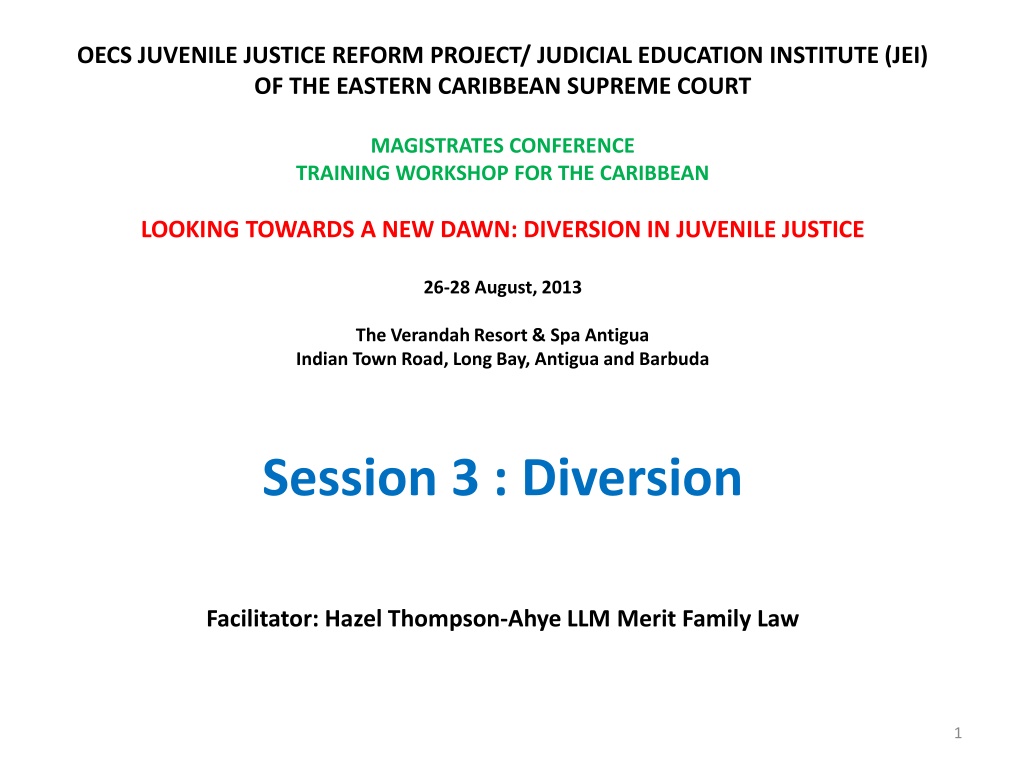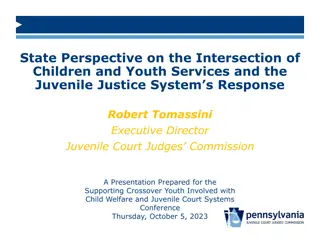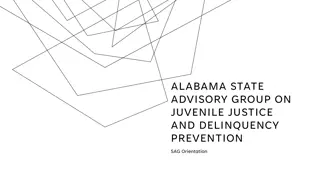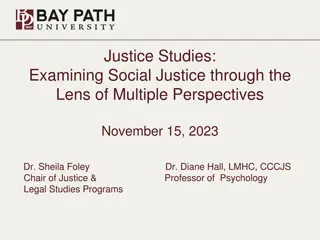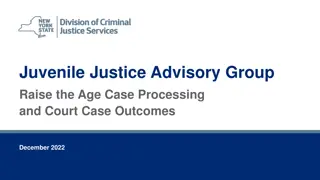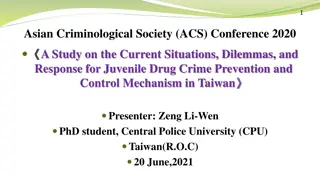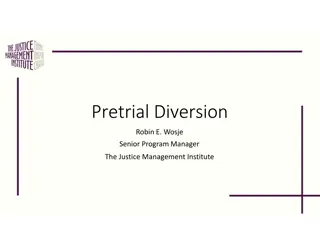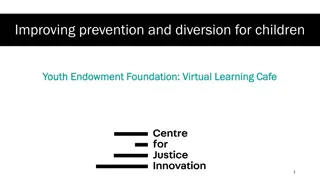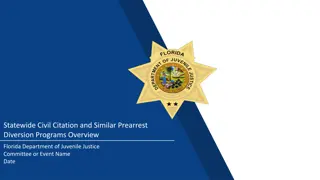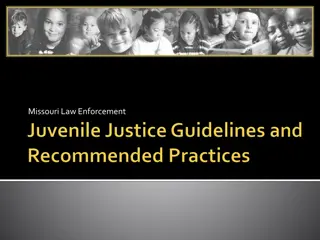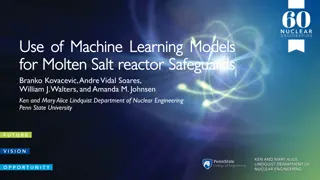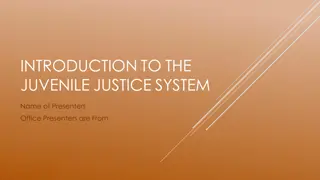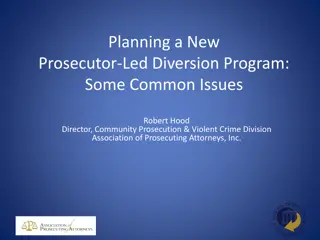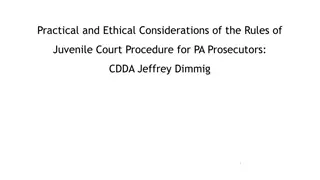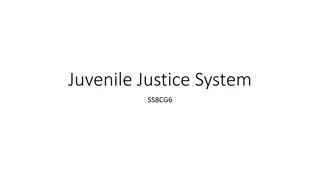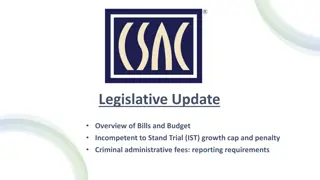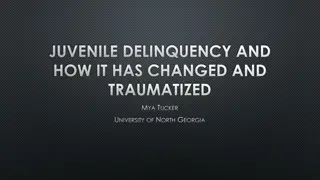Juvenile Justice Diversion Programs: Principles and Importance
Explore the concept of diversion in juvenile justice, which involves redirecting young offenders away from formal legal proceedings towards community support. Learn about the guiding principles, importance, and various diversion programs at regional and international levels. Understand how diversion can prevent stigmatization, aid in reintegration, and provide a more suitable response to delinquent behavior.
Download Presentation

Please find below an Image/Link to download the presentation.
The content on the website is provided AS IS for your information and personal use only. It may not be sold, licensed, or shared on other websites without obtaining consent from the author. Download presentation by click this link. If you encounter any issues during the download, it is possible that the publisher has removed the file from their server.
E N D
Presentation Transcript
OECS JUVENILE JUSTICE REFORM PROJECT/ JUDICIAL EDUCATION INSTITUTE (JEI) OF THE EASTERN CARIBBEAN SUPREME COURT MAGISTRATES CONFERENCE TRAINING WORKSHOP FOR THE CARIBBEAN LOOKING TOWARDS A NEW DAWN: DIVERSION IN JUVENILE JUSTICE 26-28 August, 2013 The Verandah Resort & Spa Antigua Indian Town Road, Long Bay, Antigua and Barbuda Session 3 : Diversion Facilitator: Hazel Thompson-Ahye LLM Merit Family Law 1
Diversion Definition Removal of a juvenile offender from formal juvenile justice proceedings and directing him/her towards community support, both formal and informal by police, prosecution, or other agency e.g. court. See Rule 11(2) Beijing Rules Measures for dealing with children alleged as, accused of, or recognized as having infringed the penal law without resorting to judicial proceedings, providing human rights and legal safeguards are fully respected. Article 40(3) (b) Convention on the Rights of the Child. When? At any stage of the juvenile justice process. In what type of case? Petty or serious offences. 2
Diversion Guiding Principles (CRC General Comment No 10) Human rights, legal safeguards must be respected, protected. Admission of responsibility/finding of guilt. No pressure must be applied. Free and voluntary consent to be given in writing by child, parent/guardian. Law/policy empowering police, prosecutor to divert. Availability of legal advice/appropriate assistance. Opportunity for review Completion of diversion should bring end to case. 3
Diversion Guiding Principles: See also- Guidelines for Action on Children in the Juvenile Justice System: Action 15 Appropriate steps should be taken to make available a broad range of alternative measures at pre-arrest, pre-trial, trial and post -trial . 4
IMPORTANCE OF DIVERSION Why use diversion? Avoids stigmatization of child, social isolation, negative publicity, Aids reintegration Frees the court of a number of cases Can address problematic behaviour and avoid its escalating into more serious problems Can provide an avenue for a more appropriate response to wrong-doing. 5
DIVERSION PROGRAMMES REGIONAL/ INTERNATIONAL PERSPECTIVES Informal, unstructured; formal/structured Warning, caution( police) penal warning ( court) reprimand and discharge Care, guidance, supervision, probation, foster care Counselling, family intervention programmes Compensation, restitution, confiscation of property Conditional discharge Educational and vocational training programmes Community service Mediation 6
DIVERSION PROGRAMMES REGIONAL/ INTERNATIONAL PERSPECTIVES Restorative justice (Australia, South Africa, North America) Drug treatment programmes Mentoring programmes Day report centres, Youth contracts Community monitoring Other specialist programmes 7
DIVERSION PROGRAMMES-International perspectives Juvenile Justice System Enhancement Strategy(JJSES)Penn. Professionals-Chief Probation Officers, juvenile prosecutors, defenders, delinquency service providers, juvenile court judge, victim services, children, youth administrators came together 1.Established leadership team 2.Created statement of purpose Work in partnership to enhance capacity of Pennsylvania jjses to achieve balanced and restorative justice mission by -employing evidence-based practice with fidelity at every stage of jj process -collecting and analyzing the data necessary to measure the results o these efforts; and with this knowledge, striving to continuously improve the quality of the decisions, services and programmes. ( Keith Snyder, Deputy Director Pa. Juvenile Court Judges Commission) 8
DIVERSION PROGRAMES Juvenile Justice System Enhancement Strategy(JJSES) Developed a plan/Communicate/Measure Progress Evidence - based practices: use of scientific research to guide and inform efficient and effective justice service-guide policy/practice. Objective and more accurate method to determine risk of re-offending. Research to improve consistency and objectivity. Why probation approaches ineffective? Too much attention to low risk , too little to high risk, to research, work load too high, system not in alignment, wrong focus Assessment of low risk, moderate, high, very high. 9
DIVERSION PROGRAMMES-International perspectives Juvenile Justice System Enhancement Strategy JJSES Low risk: no history anti-social behaviour, supportive family, prosocial friends, engaged positive activities Risk management (low risk) least restrictive Risk reduction (moderate/ high) address criminogenic needs) Risk control (extreme high risk) control risk of reoffending under correctional authority. Key principles Risk principle- (Who to target) The need principle- What to target Responsivity principle (How to match) Treatment Principle (Which programme) 10
DIVERSION PROGRAMMES-International Perspectives Juvenile Justice System Enhancement Strategy (JJSES) The Need Principle Antisocial thinking - blame others, takes no responsibility, lack of respect for authority Peers and associates -with delinquent histories, antisocial lifestyles, positive affirmation of antisocial acts Personality (coping skills)-problem solving, emotional regulation, anger management, impulsivity, easily bored Family- stressors in home, harsh parenting, non-caring, lack of warmth, lack of accountability, victimisation Substance abuse-drug/alcohol abuse, history of drug/alcohol abuse in home, lack of support to acquire, maintain sobriety Education- poor academic achievement, poor school attendance, conflict with school authorities, no home support Employment- poor work history, conflict on job, poor attendance, lack of support for achievement Leisure- lack of interest in social recreational pursuits, plenty idle time, lack of structure in after school hours 11
DIVERSION PROGRAMMES-International Perspectives JJSES Responsivity principle- Identifying mode and style of service suitable for juvenile this involves matching learning style and abilities of offender with personnel delivering service. Treatment principle-What does not work- Punishment, sanctions, incarceration, fear-based programme-scared straight, shaming programme, intensive supervison without treatment, drug education, drug prevention focusing on fear or emotional appeal, non-action group counselling What works-programmes that focus on criminogenic needs, match offender to right programme, family- based approach, positive reinforcement, seek right level of dosage, intensity. Know the who, what, how, which. 12
DIVERSION PROGRAMMES-International Perspectives Cognitive-behavioural therapy (CBT) Services geared towards specific risks and needs of offender- evaluation-impact treatment of reoffending positive cost-benefit outcome Blend of behavioural theory- external behavours and cognitive therapy-internal thought process Develop skills for living in harmony with community and engage in behaviour that contribute to positive outcomes in society Not enough for individuals to resolve own personal problems treatment focus on responsibility towards others and community. Two important components: 1. Provider 2. Relationship between provider and client Milkman, H and Kenneth Wanberg: Cognitive- Behavioural Treatment A review and discussion for Corrections Professionals 13
DIVERSION PROGRAMMES-International Perspectives Eg.CBT programme: Aggression Replacement Training-ART An intervention for aggressive adolescents and children consistent with the restorative practice framework. Studies have shown its efficacy with skill learning, anger control and reducing recidivism. 3 components: 1. SkillStreaming (behavioural component)-social skills training- a curriculum of prosocial, interpersonal skills- what to do instead of aggression, dealing with anger -provoking events. 2. Anger Control Training (affective component)- teaches youth what not to do if provoked- teaches self control competencies. 3. Moral responsibilty training (cognitive component) - promotes values that respect the rights of others, raise level of sense of fairness, justice, help youths want to use the interpersonal and anger management skills taught International Institute for Restorative Practices 10 week, 30 hour intervention programme administered to groups of 8 12 youths three times per week 14
DIVERSION Some concerns Net widening Diversion programmes designed to divert youths from the judicial process might bring into the system youths who otherwise might not have entered the system because of paucity of evidence. Infringement of due process Right to silence / presumption of innocence at risk? 15
